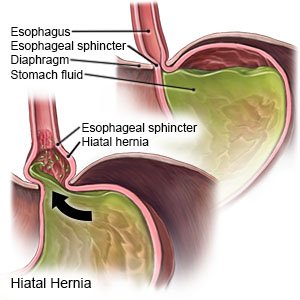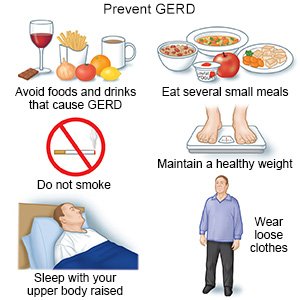Hiatal Hernia
Medically reviewed by Drugs.com. Last updated on Apr 6, 2025.
A hiatal hernia is a condition that causes part of your stomach to bulge through the hiatus (small opening) in your diaphragm. The part of the stomach may move up and down, or it may get trapped above the diaphragm.
 |
DISCHARGE INSTRUCTIONS:
Call your local emergency number (911 in the US) if:
- You have severe chest pain and sudden trouble breathing.
Seek care immediately if:
- You have severe abdominal pain.
- You try to vomit but nothing comes out (retching).
- Your bowel movements are black or bloody.
- Your vomit looks like coffee grounds or has blood in it.
- You cannot swallow food or liquids.
Call your doctor or gastroenterologist if:
- Your symptoms get worse or do not improve with treatment.
- You are losing weight without trying.
- You have questions or concerns about your condition or care.
Medicines:
- Medicines may be given to relieve heartburn symptoms. These medicines help to decrease or block stomach acid. You may also be given medicines that help tighten the esophageal sphincter.
- Take your medicine as directed. Contact your healthcare provider if you think your medicine is not helping or if you have side effects. Tell your provider if you are allergic to any medicine. Keep a list of the medicines, vitamins, and herbs you take. Include the amounts, and when and why you take them. Bring the list or the pill bottles to follow-up visits. Carry your medicine list with you in case of an emergency.
Manage your symptoms:
The following nutrition and lifestyle changes may be recommended to relieve symptoms of heartburn:
 |
- Avoid foods or drinks that may increase heartburn. These include chocolate, peppermint, fatty or fried foods, drinks that contain caffeine, or carbonated drinks (soda). Other foods include spicy foods, onions, tomatoes, and tomato-based foods. Do not have foods or drinks that can irritate your esophagus, such as citrus fruits, juices, and alcohol.
- Eat several small meals during the day. When you eat a lot of food at one time, your stomach needs more acid to digest it. Eat 6 small meals each day instead of 3 large meals. Eat slowly.
- Do not lie down after you eat. Do not eat meals 2 to 3 hours before bedtime.
- Do not put pressure on your abdomen. Pressure may worsen your hiatal hernia. Do not wear clothing that is tight around your waist. Do not bend forward after you eat.
- Maintain a healthy weight. If your body weight is higher than recommended, weight loss may help relieve your symptoms. Your healthcare provider will tell you what a healthy weight is for you. Your provider can help you create a safe weight loss plan, if needed.
- Elevate the head of your bed. Place 6-inch blocks under the head of your bed frame. You may also place more than one pillow or a foam wedge under your head and shoulders when you sleep.
- Do not smoke. Nicotine and other chemicals in cigarettes and cigars may worsen heartburn. Ask your provider for information if you currently smoke and need help to quit. E-cigarettes or smokeless tobacco still contain nicotine. Talk to your provider before you use these products.
Treatment options
The following list of medications are related to or used in the treatment of this condition.
- omeprazole
- famotidine
- lansoprazole
- aluminum hydroxide/magnesium hydroxide/simethicone
- aluminum hydroxide/magnesium trisilicate
Follow up with your doctor or gastroenterologist as directed:
Write down your questions so you remember to ask them during your visits.
© Copyright Merative 2025 Information is for End User's use only and may not be sold, redistributed or otherwise used for commercial purposes.
The above information is an educational aid only. It is not intended as medical advice for individual conditions or treatments. Talk to your doctor, nurse or pharmacist before following any medical regimen to see if it is safe and effective for you.
Learn more about Hiatal Hernia
Treatment options
Care guides
Symptoms and treatments
Further information
Always consult your healthcare provider to ensure the information displayed on this page applies to your personal circumstances.
